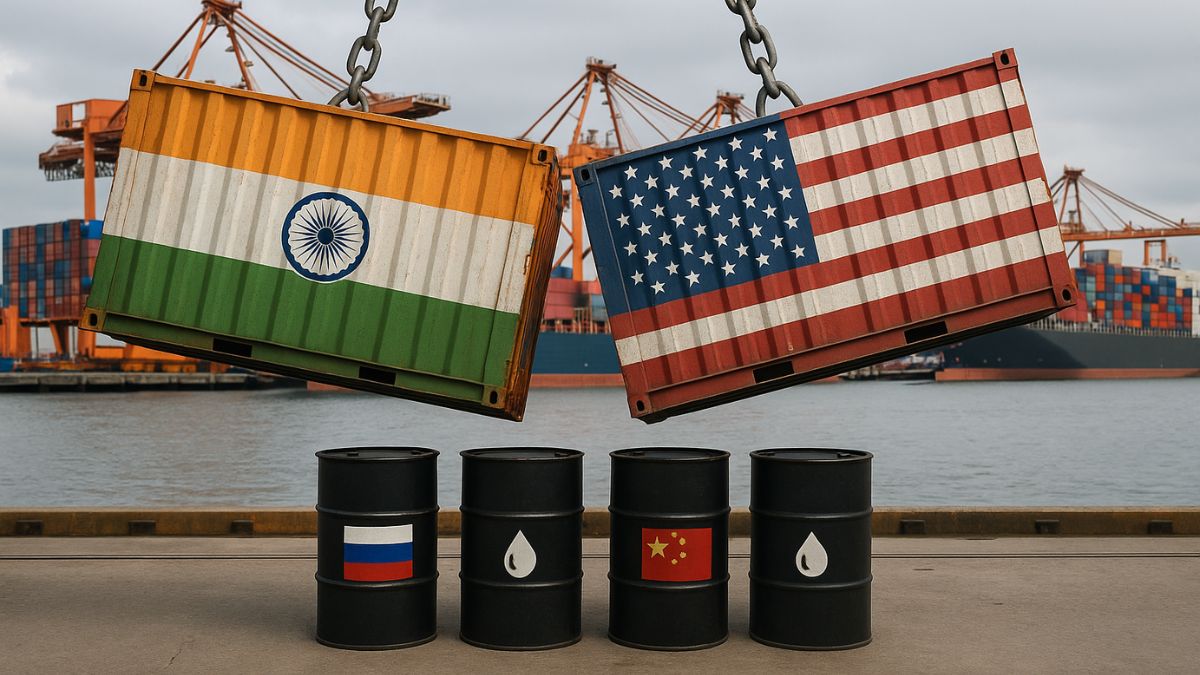Why US Tariffs On India Are Unfair Compared To Its Stance on China

While the US is levying heavy tariffs on India over trade of Russian oil, it has remained mum on China doing the same on a much larger scale. AI-generated image via DALL-E
The United States’ decision to impose steep tariffs on India for its trade with Russia, while sparing China from similar punitive measures, underscores a clear double standard in Washington’s approach to sanctions enforcement.
US Secretary of State Marco Rubio recently justified why Beijing, the world’s largest buyer of Russian oil, has been spared secondary sanctions, even as India faces a 50 percent tariff, of which 25 percent specifically targets its trade with Moscow.
His explanation not only exposes contradictions but also raises questions of fairness in how the US applies its foreign policy.
Why was China spared, India penalised?
According to Rubio, China is purchasing massive volumes of Russian oil, refining it, and then selling it back into the global marketplace, including to Europe.
He argued that imposing sanctions on China would disrupt the global oil supply chain and cause a sharp rise in energy prices. In contrast, India, whose Russian oil imports are significantly smaller, has been singled out for tariffs.
This reasoning is deeply problematic. If the US believes that sanctioning China would harm global markets, why penalise India, whose purchases neither distort the market nor significantly raise prices?
India’s imports are largely meant for domestic consumption, ensuring energy security for its 1.4 billion citizens, rather than profiting from resale to Europe. Yet, Washington has chosen to shield Beijing’s actions while punishing New Delhi’s.
Is the US ignoring Europe’s role?
Rubio himself admitted that much of the Russian oil refined in China is re-exported to Europe, and that European nations have voiced concern over potential sanctions on Beijing.
This highlights a glaring inconsistency. European countries, in effect, continue to consume Russian oil via China, but face no penalties. Instead, India, which is also reselling Russian crude to the West but in limited quantities, is being burdened with unfair tariffs.
The US has conveniently overlooked Europe’s complicity while projecting India as a softer target. By sparing China and Europe, Washington has demonstrated that its sanctions policy is guided less by principles and more by economic and geopolitical expediency.
India’s reliance on discounted Russian oil stems from its need to stabilise energy prices for its vast population and growing economy.
Unlike China, which is leveraging Russian crude to profit from refined product exports, India is using these imports to shield its citizens from inflation and ensure energy security. To punish India for this while giving China a free pass reveals an unjustified bias in Washington’s approach.
Is the US action undermining the strategic partnership?
The US has consistently touted India as a key strategic partner in the Indo-Pacific, vital to counterbalancing China’s rise.
Yet, imposing punitive tariffs on New Delhi while sparing Beijing sends the opposite signal. Such actions risk alienating India, weakening trust, and undermining the very strategic partnership Washington claims to value.
America’s leniency towards China and Europe, contrasted with its harsh tariffs on India, exposes a troubling inconsistency in its sanctions regime.
If the real concern is global energy stability, India’s limited and necessity-driven imports cannot be equated with China’s profit-driven oil trade.
By penalising New Delhi and sparing Beijing, Washington has demonstrated a selective application of sanctions that is both unfair and unjustified.







